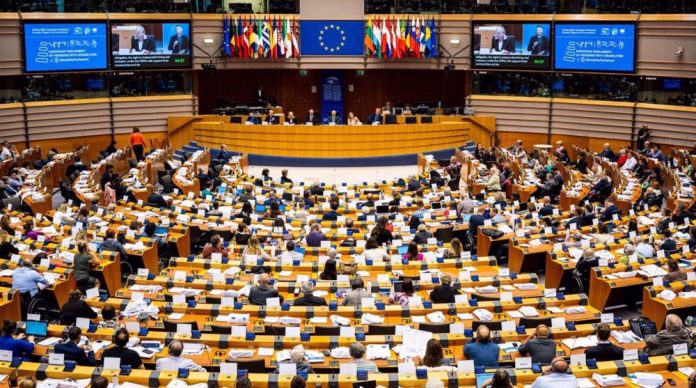Employees of European institutions have expressed their dissatisfaction with the EU’s handling of Israel’s war on Gaza through regular protests. More than 1,500 people have signed a letter stating that “the EU is still failing to take a stand against this humanitarian catastrophe,” The Parliament reports.
About 100 EU officials gathered in Brussels on Thursday in the square between the European Commission and the Council, as they have done regularly since December.
One read out the names of Palestinian children killed in the Israeli offensive in Gaza. Others hold banners reading “EU staff for peace and justice” and “EU staff for an immediate ceasefire.” One young woman who prefers to remain anonymous said:
We are just standing by EU values. We want Israel to comply with the UN resolutions and the ruling of the International Court of Justice and we want to show our protest against the EU’s inactivity and against the hostilities.
Another woman said:
Being part of this organ, we should be able to call out our leadership for being inactive or even complicit with genocide. The reason why we have prepared this letter and why we have gathered today in front of these institutions is precisely because we believe in the Union.
Protesters began using the word “genocide” after South Africa accused Israel of the offence at the International Court of Justice (ICJ) in January, and the body subsequently ordered Israel to prevent acts of genocide. Israel has rejected the charge, saying its campaign against Hamas, the Palestinian militant organisation that rules the Gaza Strip, is justified.
Israel invaded Gaza after the group carried out a terror attack on October 7 that killed about 1,200 Israelis, mostly civilians. Hamas militants also took some 240 hostages, many of whom are still in captivity. Israel’s subsequent military operation killed more than 35,000 Palestinians – about half women and children, according to the UN – and several hundred Israeli soldiers.
In late May, International Criminal Court prosecutor Karim Khan requested arrest warrants for Israeli Prime Minister Benjamin Netanyahu and three Hamas leaders, accusing them of war crimes. Israeli and Palestinian leaders have denied the charges.
Pressure from within
Protests outside EU institutions have become a regular occurrence, with another action planned for this Thursday, this time in Luxembourg Square to coincide with the European Council meeting.
A letter calling for EU “indifference” and “inaction” on the Gaza crisis has gathered 1,589 signatures from current and former staff of the EU institutions. The letter says Israel’s military campaign “violates international law and also contradicts the EU’s core values and its goal of promoting peace.”
The letter, addressed to the leaders of the European Commission, Parliament and the EU Council, condemns “the heinous attack by Hamas on October 7… in the strongest possible terms” and calls for the release of all hostages as well as an immediate ceasefire.
For its part, a Commission spokesperson told The Parliament:
Staff members have the opportunity to express their views on a subject, bearing in mind a certain number of principles set up in the staff regulation, and the hierarchy is there to listen to that. But this has to be separated from the potential impact on the formulation of the foreign policy.
The representative also drew attention to the requirement of “loyalty to institutions” set out in the institute’s rules for staff. Zeno Benetti, one of the letter’s co-authors, who works for an EU agency in Paris and made his way to Brussels for the most recent protest, said:
The reason why we drafted this letter in the first place and why we are gathering in front of the institutions today is precisely because we believe in the Union and because we feel loyal to the Union. It’s not an action directed against our institution. It’s an action to uphold the values enshrined in the Union’s treaties…it is not to push my personal political agenda.
Personal connections
There are people within the EU institutions with a personal stake in the conflict. Both Israelis and Palestinians are linked to numerous diasporas, including in Europe. On the Palestinian side, some feel loyal to the EU. One half-Palestinian EU staffer, who wishes to remain anonymous and has decided to cut their contract short, said:
I felt the EU was always on the right side and cared about human rights,” says “Now it feels like it was all fake.
The officer draws a comparison with the EU’s support to Ukraine since the outbreak of the military conflict in early 2022 – both in terms of foreign policy and approach within the European institutions. They said:
There is an internal association that takes donations and organises charity events. When we tried to reach out several times asking if we can raise funds for children in Gaza, we were ignored. Later, we received an email collecting money for Ukrainian kids. It felt insulting.
Sven Kühn von Burgsdorf, former EU ambassador to the Palestinian territories, told Parliament that it will take a long time to correct the current situation of double standards. He said:
I can understand why people everywhere in the world are disillusioned. Especially in the global south and in the Arab world, the EU has considerably damaged its reputation.
Meanwhile, Benetti argued that the large number of signatories to the open letter deserves a response from the bloc’s leadership. He added:
When this many employees raise the very same concern, you should at least give an explanation.
European Parliament President Roberta Metsola and Council President Charles Michel did not respond to requests for comment from The Parliament.
